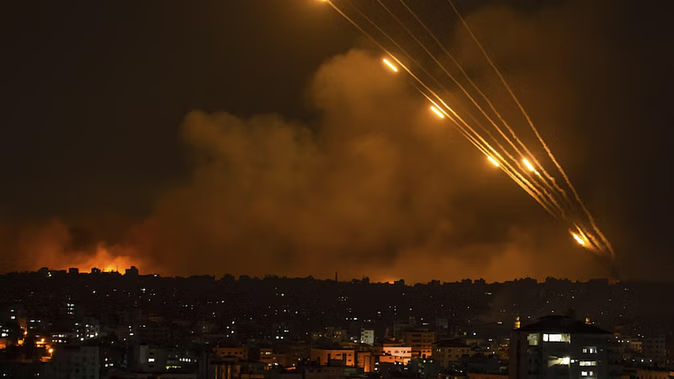Rocket Fire from Syria Escalates Tensions with Israel; Defense Minister Issues Warning to President Ahmed Al-Shara
Tensions in the Middle East have flared up once again following a rocket attack launched from Syrian territory into Israel, prompting a stern warning from Israeli Defense Minister Israel Katz, who directly threatened Syrian President Ahmed Al-Shara. This incident marks a significant escalation, especially as it comes shortly after the United States relaxed sanctions on Syria—a move widely interpreted as an effort to ease diplomatic relations and possibly normalize ties with the Assad-successor government.
On Tuesday, multiple rockets were fired from Syria into Israel, targeting the Golan Heights region. This is the first such cross-border attack since the fall of the Bashar al-Assad regime and the installment of the new Syrian leadership under President Ahmed Al-Shara. Although the rockets landed in open fields and caused no casualties or infrastructure damage, the symbolic nature of the attack has reignited regional concerns.
In swift retaliation, the Israeli military responded by launching airstrikes on targets in Syria, particularly in the Daraa province, from where the attack is believed to have originated. Syrian media outlets reported hearing loud explosions across Daraa as a result of the Israeli air raids.
Militant Group Claims Responsibility
The rocket fire was claimed by a lesser-known militant group named the Mohammad Daif Brigades—a faction that has recently surfaced on social media platforms. The group is reportedly named after Mohammad Daif, a prominent Hamas military commander who was killed by Israeli forces in an airstrike last year. Until now, the group had not been widely recognized or considered a serious threat. However, this attack has drawn attention to its emergence and potential influence in the already volatile region.
According to initial intelligence reports, the group fired the rockets from a launch site in Syria’s western Daraa province, near the border with Israel. Though the attack caused no physical damage, its political and strategic consequences have been significant.
Israeli Defense Minister Issues Direct Threat
In response to the attack, Israeli Defense Minister Israel Katz issued a strongly worded statement, holding the Syrian leadership personally accountable for all hostile activities originating from its soil. Katz emphasized that Israel will no longer differentiate between rogue militant groups and the Syrian state itself, and that President Ahmed Al-Shara will be held directly responsible for any future provocations.
“Any threat or attack from Syrian territory will be treated as an act of war by the Syrian government,” said Katz. “Our response will be immediate and uncompromising.”
The Israeli government has grown increasingly wary of the new leadership in Damascus since Ahmed Al-Shara assumed power. The previous Assad regime maintained a relatively restrained posture toward Israel in recent years, but Israel now views the current administration with deep suspicion, especially in light of recent developments and shifting alliances in the region.
Syria Responds, Calls for Peace
In the wake of the rocket fire and the Israeli retaliation, the Syrian government issued an official statement condemning the Israeli airstrikes. The statement also clarified that Syria does not seek hostility or conflict with Israel or any other nation. It reaffirmed Syria’s commitment to regional peace and stability, denying any state involvement in the rocket attack.
“The Syrian Arab Republic is committed to peace and does not pose a threat to Israel or its neighbors,” the statement read. “We condemn the Israeli aggression and urge all parties to avoid further escalation.”
Despite the Syrian government’s call for calm, the situation remains fragile. The rocket attack, coupled with Israel’s firm stance and military response, has added to a growing list of security concerns in the region. With the emergence of new militant groups and the geopolitical reshuffling following the U.S. policy shift toward Syria, analysts warn that the Middle East may be heading into another phase of heightened tension.
